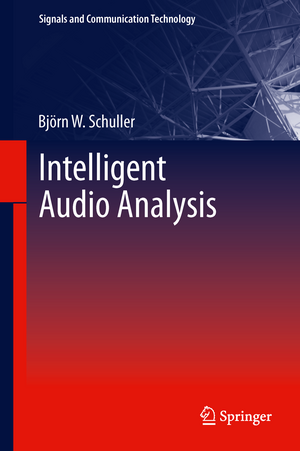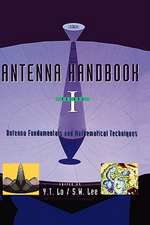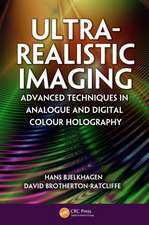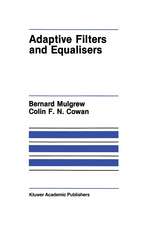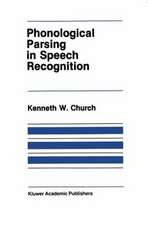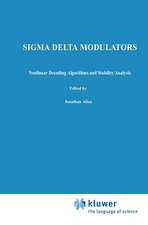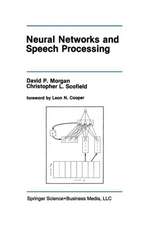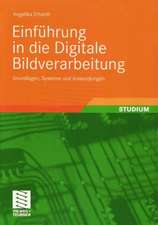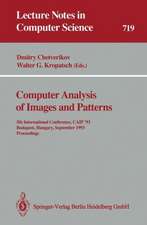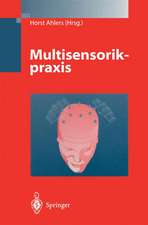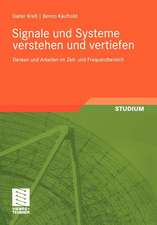Intelligent Audio Analysis: Signals and Communication Technology
Autor Björn W. Schulleren Limba Engleză Hardback – 8 mai 2013
After the introductory parts, the book shows several applications for the three types of audio: speech, music, and general sound. Each task is shortly introduced, followed by a description of the specific data and methods applied, experiments and results, and a conclusion for this specific task.
The books provides benchmark results and standardized test-beds for a broader range of audio analysis tasks. The main focus thereby lies on the parallel advancement of realism in audio analysis, as too often today’s results are overly optimistic owing to idealized testing conditions, and it serves to stimulate synergies arising from transfer of methods and leads to a holistic audio analysis.
| Toate formatele și edițiile | Preț | Express |
|---|---|---|
| Paperback (1) | 644.30 lei 6-8 săpt. | |
| Springer Berlin, Heidelberg – 19 mai 2015 | 644.30 lei 6-8 săpt. | |
| Hardback (1) | 649.06 lei 6-8 săpt. | |
| Springer Berlin, Heidelberg – 8 mai 2013 | 649.06 lei 6-8 săpt. |
Din seria Signals and Communication Technology
- 18%
 Preț: 952.89 lei
Preț: 952.89 lei - 18%
 Preț: 1559.80 lei
Preț: 1559.80 lei - 17%
 Preț: 361.80 lei
Preț: 361.80 lei - 18%
 Preț: 811.61 lei
Preț: 811.61 lei - 15%
 Preț: 585.26 lei
Preț: 585.26 lei - 18%
 Preț: 727.97 lei
Preț: 727.97 lei - 15%
 Preț: 585.90 lei
Preț: 585.90 lei -
 Preț: 393.35 lei
Preț: 393.35 lei - 20%
 Preț: 1002.73 lei
Preț: 1002.73 lei - 15%
 Preț: 641.71 lei
Preț: 641.71 lei - 20%
 Preț: 338.92 lei
Preț: 338.92 lei - 18%
 Preț: 1579.66 lei
Preț: 1579.66 lei - 18%
 Preț: 896.08 lei
Preț: 896.08 lei - 18%
 Preț: 847.11 lei
Preț: 847.11 lei - 18%
 Preț: 1234.77 lei
Preț: 1234.77 lei - 18%
 Preț: 905.54 lei
Preț: 905.54 lei - 15%
 Preț: 646.43 lei
Preț: 646.43 lei - 20%
 Preț: 662.48 lei
Preț: 662.48 lei - 15%
 Preț: 641.20 lei
Preț: 641.20 lei - 18%
 Preț: 1847.84 lei
Preț: 1847.84 lei - 18%
 Preț: 946.24 lei
Preț: 946.24 lei - 18%
 Preț: 1241.10 lei
Preț: 1241.10 lei - 20%
 Preț: 649.43 lei
Preț: 649.43 lei - 20%
 Preț: 993.28 lei
Preț: 993.28 lei - 18%
 Preț: 940.57 lei
Preț: 940.57 lei - 18%
 Preț: 1389.30 lei
Preț: 1389.30 lei - 20%
 Preț: 1003.50 lei
Preț: 1003.50 lei - 18%
 Preț: 953.52 lei
Preț: 953.52 lei - 20%
 Preț: 1001.16 lei
Preț: 1001.16 lei - 18%
 Preț: 1415.36 lei
Preț: 1415.36 lei - 15%
 Preț: 653.33 lei
Preț: 653.33 lei - 15%
 Preț: 645.60 lei
Preț: 645.60 lei - 15%
 Preț: 637.28 lei
Preț: 637.28 lei - 18%
 Preț: 948.79 lei
Preț: 948.79 lei - 18%
 Preț: 945.62 lei
Preț: 945.62 lei - 18%
 Preț: 836.36 lei
Preț: 836.36 lei - 18%
 Preț: 1225.46 lei
Preț: 1225.46 lei - 15%
 Preț: 635.01 lei
Preț: 635.01 lei - 15%
 Preț: 639.25 lei
Preț: 639.25 lei - 15%
 Preț: 646.30 lei
Preț: 646.30 lei - 15%
 Preț: 639.25 lei
Preț: 639.25 lei - 15%
 Preț: 712.36 lei
Preț: 712.36 lei - 20%
 Preț: 1006.12 lei
Preț: 1006.12 lei - 18%
 Preț: 970.56 lei
Preț: 970.56 lei
Preț: 649.06 lei
Preț vechi: 763.60 lei
-15% Nou
Puncte Express: 974
Preț estimativ în valută:
124.21€ • 134.88$ • 104.34£
124.21€ • 134.88$ • 104.34£
Carte tipărită la comandă
Livrare economică 22 aprilie-06 mai
Preluare comenzi: 021 569.72.76
Specificații
ISBN-13: 9783642368059
ISBN-10: 3642368050
Pagini: 400
Ilustrații: XXVIII, 345 p.
Dimensiuni: 155 x 235 x 27 mm
Greutate: 0.66 kg
Ediția:2013
Editura: Springer Berlin, Heidelberg
Colecția Springer
Seria Signals and Communication Technology
Locul publicării:Berlin, Heidelberg, Germany
ISBN-10: 3642368050
Pagini: 400
Ilustrații: XXVIII, 345 p.
Dimensiuni: 155 x 235 x 27 mm
Greutate: 0.66 kg
Ediția:2013
Editura: Springer Berlin, Heidelberg
Colecția Springer
Seria Signals and Communication Technology
Locul publicării:Berlin, Heidelberg, Germany
Public țintă
ResearchCuprins
Part I Introduction.- Intelligent Audio Analysis: a Definition.- Motivation, Aims, and Solutions.- Structure of this book.- Part II Intelligent Audio Analysis Methods.- Chain of Processing.- Audio Data.- Audio Features.- Audio Recognition.- Audio Source Separation: openBlissART.- Audio Enhancement and Robustness.- Part III Intelligent Audio Analysis Applications.- Applications in Intelligent Speech Analysis.- Applications in Intelligent Music Analysis.- Applications in Intelligent Sound Analysis.- Part IV Conclusion.- Discussion.- Vision.- openSMILE Standardised Feature Sets.
Textul de pe ultima copertă
This book provides the reader with the knowledge necessary for comprehension of the field of Intelligent Audio Analysis. It firstly introduces standard methods and discusses the typical Intelligent Audio Analysis chain going from audio data to audio features to audio recognition. Further, an introduction to audio source separation, and enhancement and robustness are given.
After the introductory parts, the book shows several applications for the three types of audio: speech, music, and general sound. Each task is shortly introduced, followed by a description of the specific data and methods applied, experiments and results, and a conclusion for this specific task.
The books provides benchmark results and standardized test-beds for a broader range of audio analysis tasks. The main focus thereby lies on the parallel advancement of realism in audio analysis, as too often today’s results are overly optimistic owing to idealized testing conditions, and it serves to stimulate synergies arising from transfer of methods and leads to a holistic audio analysis.
After the introductory parts, the book shows several applications for the three types of audio: speech, music, and general sound. Each task is shortly introduced, followed by a description of the specific data and methods applied, experiments and results, and a conclusion for this specific task.
The books provides benchmark results and standardized test-beds for a broader range of audio analysis tasks. The main focus thereby lies on the parallel advancement of realism in audio analysis, as too often today’s results are overly optimistic owing to idealized testing conditions, and it serves to stimulate synergies arising from transfer of methods and leads to a holistic audio analysis.
Caracteristici
Provides benchmark results and standardised test-beds for a broader range of audio analysis tasks Extends the range of Intelligent Audio Analysis application by showing its potential in new tasks Stimulates synergies arising from transfer of methods and lead to a holistic audio analysis Shows deficiencies in current approaches and sketches future perspectives Includes supplementary material: sn.pub/extras
